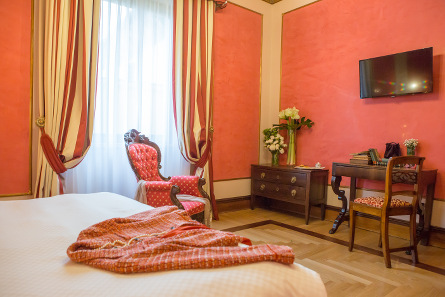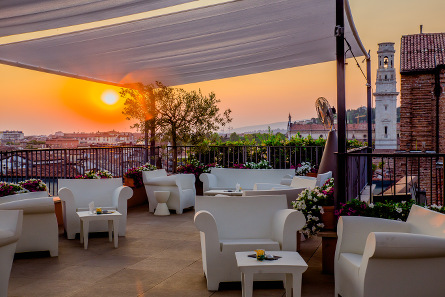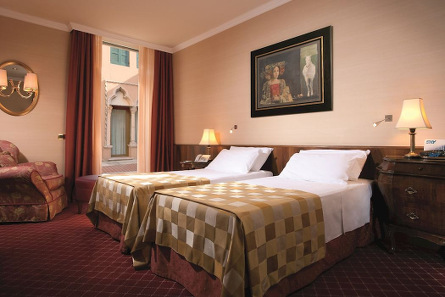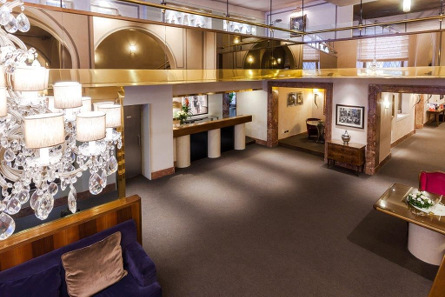Aida♪, G. Verdi, the 20.
Turandot♪, G. Puccini, the 22.





from Wednesday 19 to Sunday 23 June 2024,
4 nights
Arrangement 2
Arrangement 2
Aida
G. Verdi
G. Verdi
Giuseppe Verdi (1813-1901) wrote his “Aida” at a politically highly explosive time: Germany and France were on the brink of war (Franco-Prussian War 1870/71), which is why the premiere could not take place until a year later after the scheduled date: Because both the stage sets and the costumes were stuck in the Prussian occupied Paris. The opera had been commissioned by the Egyptian Viceroy Ismail Pasha. However, not, as often wrongly assumed, for the inauguration of the Suez Canal, but for the opening of the new opera house in Cairo in 1871.
Aida shows the versatility of this exceptional Italian composer in its entirety: large-scale mass scenes and choruses are juxtaposed with equally intimate, chamber-play-like scenes that reveal a soul drama that is ingenious in every detail. In this respect, the work can certainly be interpreted as a turning point in Verdi’s oeuvre, as it not only focuses on the vocal parts, but also assigns a new and leading role to the orchestra.
Verdi received the 150,000 gold francs demanded for his composition, probably the highest honorarium granted to a composer to date. In addition, he demanded his own trumpets for the famous Triumphal March, the so-called Aida trumpets, which had to be commissioned as a special production. Today "Aida" is one of the most successful of the great operas of the 19th century.
Aida shows the versatility of this exceptional Italian composer in its entirety: large-scale mass scenes and choruses are juxtaposed with equally intimate, chamber-play-like scenes that reveal a soul drama that is ingenious in every detail. In this respect, the work can certainly be interpreted as a turning point in Verdi’s oeuvre, as it not only focuses on the vocal parts, but also assigns a new and leading role to the orchestra.
Verdi received the 150,000 gold francs demanded for his composition, probably the highest honorarium granted to a composer to date. In addition, he demanded his own trumpets for the famous Triumphal March, the so-called Aida trumpets, which had to be commissioned as a special production. Today "Aida" is one of the most successful of the great operas of the 19th century.
Marco Armiliato - Stefano Poda
Marta Torbidoni, Agnieszka Rehlis, Amartuvshin Enkhbat, Rafal Siwek, Riccardo Fassi
Arena
The Barber of Seville, G. Rossini, the 21.
George Petrou - Hugo de Ana
Vasilisa Berzhanskaya, Marianna Mappa, René Barbera, Mattia Olivieri
Arena
Turandot
G. Puccini
G. Puccini
When Giacomo Puccini died in Brussels in November 1924 as a result of cancer, his composition of "Turandot" was still unfinished. The composer Franco Alfano (1876-1954) was then commissioned to complete the opera. At the premiere at the Teatro alla Scala, the work was performed as a homage to Puccini only up to Liù’s death aria. The conductor Arturo Toscanini addressed the audience at this point: "Here the opera ends, because this is where the master died".
"Turandot" can be regarded as the culmination of Puccini’s creative output, since it perfectly combines all four elements that characterize his incomparable style: The slave Liù symbolizes the lyrical-sentimental element, the pair Turandot/Kalaf the heroic, while the three courtiers stand for the comic-grotesque. The exotic element is achieved by using authentic Chinese sages and pentatonic motifs.
Compared to his other works, "Turandot" has greater echoes of contemporary musical trends, as well as dissonances, polytonal effects and, for the traditionally trained listener, irritating effects in singing and orchestration, making it - compared to his earlier operas - long less popular with the audience. In the meantime, however, Puccini’s last work has established itself on the opera stages. In it, his life’s work is bundled and gives room for speculation as to what the composer’s further musical development might have been like.
"Turandot" can be regarded as the culmination of Puccini’s creative output, since it perfectly combines all four elements that characterize his incomparable style: The slave Liù symbolizes the lyrical-sentimental element, the pair Turandot/Kalaf the heroic, while the three courtiers stand for the comic-grotesque. The exotic element is achieved by using authentic Chinese sages and pentatonic motifs.
Compared to his other works, "Turandot" has greater echoes of contemporary musical trends, as well as dissonances, polytonal effects and, for the traditionally trained listener, irritating effects in singing and orchestration, making it - compared to his earlier operas - long less popular with the audience. In the meantime, however, Puccini’s last work has established itself on the opera stages. In it, his life’s work is bundled and gives room for speculation as to what the composer’s further musical development might have been like.
Michele Spotti - Franco Zeffirelli
Anna Pirozzi, Daria Rybak, Gregory Kunde, Riccardo Fassi
Arena
Hotel informations for Verona 2


Due Torri *****
The Due Torri Hotel *****, housed in a medieval building from the 14th century, is the first choice for the demanding Verona traveler. It exudes the charm of its rich past and offers guests all the comfort and unobtrusive luxury. From the spacious roof terrace you can enjoy the aperitivo, the magnificent view over the city to the Alps. Located in the heart of the historic center, close to the River Adige and the Church of Sant’Anastasia, the hotel is within easy walking distance of all major attractions. The Arena di Verona is a short 15-minute walk away.


Accademia ****
The Accademia hotel **** offers tradition, comfort and a pleasant service. It is situated in the historical town centre, only 100 metres away from the Arenas, in a very quiet street, perpendicular to the famous Via Mazzini, symbol of the elegance and the luxury of Verona. This establishment of 94 rooms has a bar, a restaurant and a private garage.
All-inclusive price per person for Verona 2
Single room/ night
Due Torri
3.690,- Euro
170-210,- Euro
Accademia
from 2.970,- Euro
190-230,- Euro

The price includes
Overnights including breakfast, good opera tickets, scheduled flight, return taxi transfers, travel cancellation expenses insurance.





